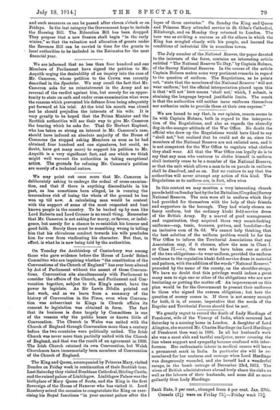On Tuesday the Archbishop of Canterbury was among those who
gave evidence before the House of Lords' Select Committee who are inquiring whether "the constitution of the Convocations of the Church of England" has ever been altered by Act of Parliament without the assent of those Convoca- tions. Convocation site simultaneously with Parliament to consider the affairs of the Church, and Parliament and Con- vocation together, subject to the King's assent, have the power to legislate. As Sir Lewis Dibdin pointed out last week, and as we learn from a summary of the history of Convocation in the Times, even when Convoca- tion was subservient to Kings in Church affairs its consent to legislation was obtained in form. The fact that its business is done largely by Committees is one of the reasons why the public hears or knows little of Convocation. The Church in Wales was united with the Church of England through Convocation more than a century before the two countries were politically united. The Irish Church was never more than partially united with the Church of England, and that was the result of an agreement in 1800. The Irish Church retained its own Convocation, but Welsh Churchmen have immemorially been members of Convocation of the Church of England.










































 Previous page
Previous page